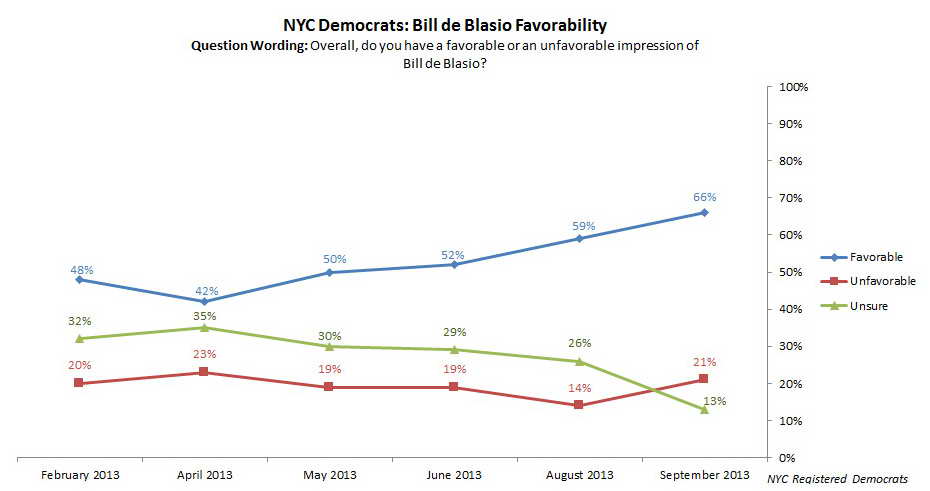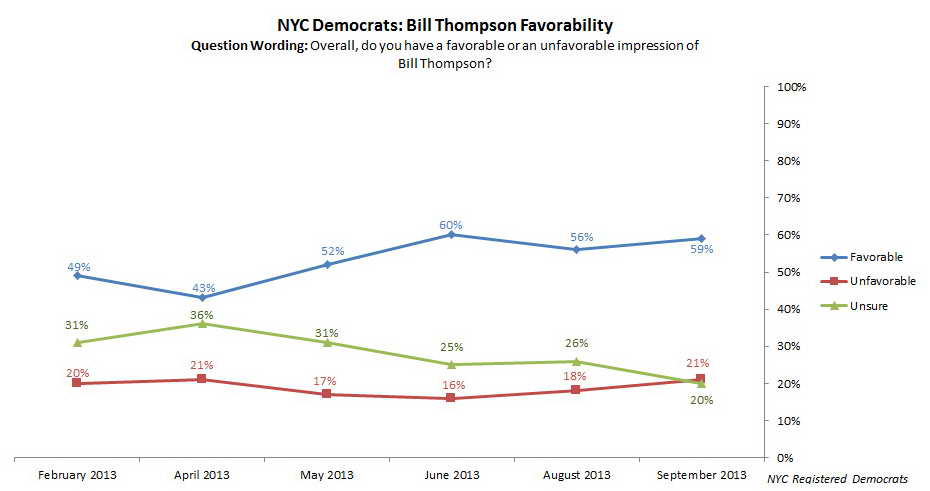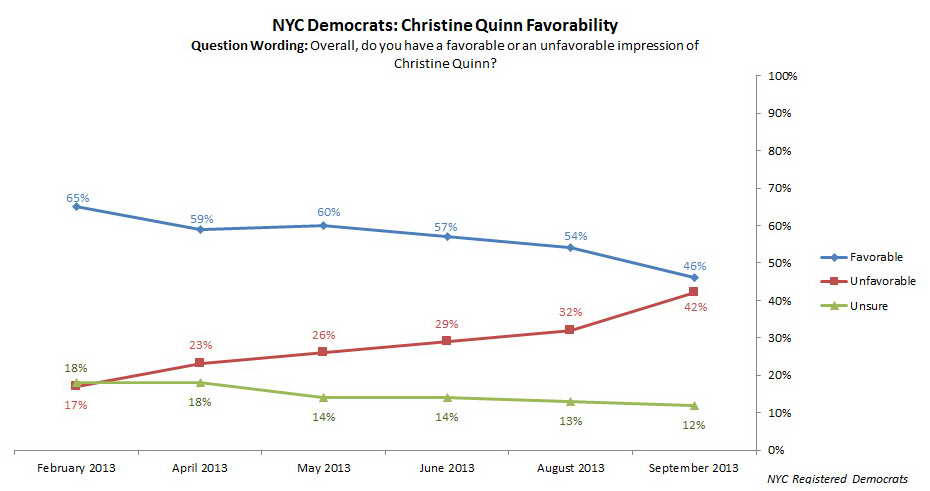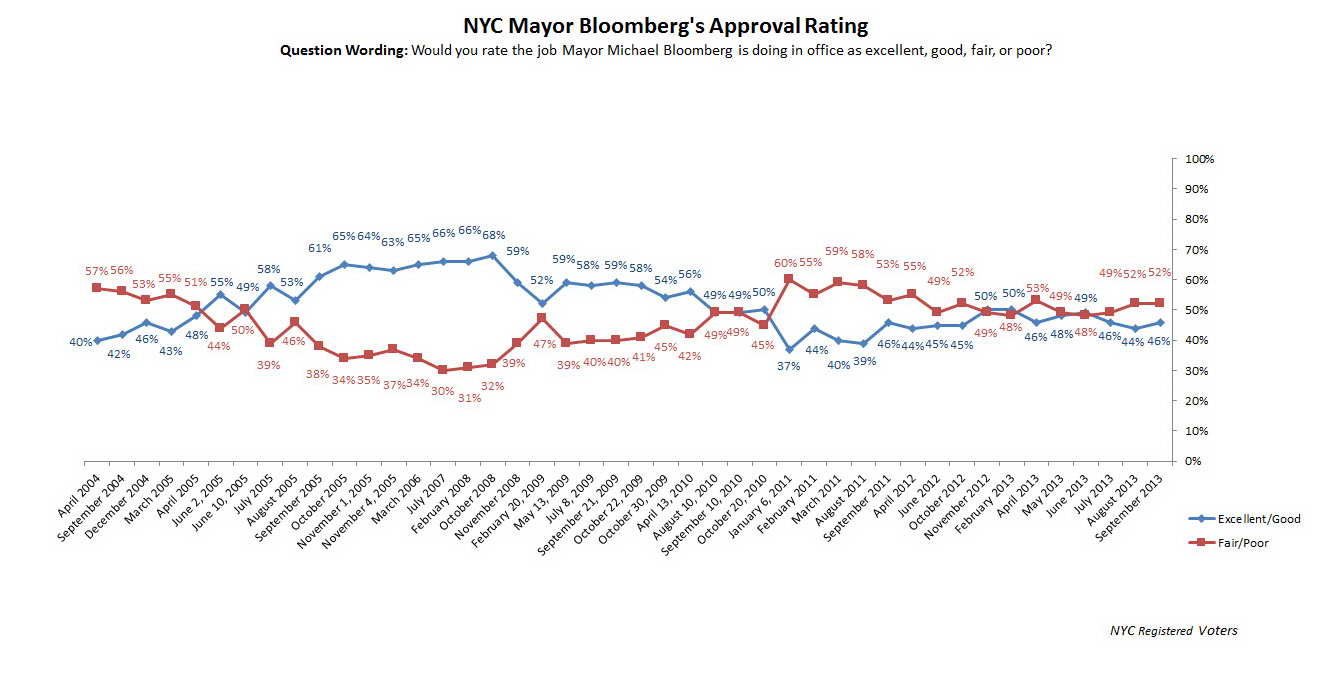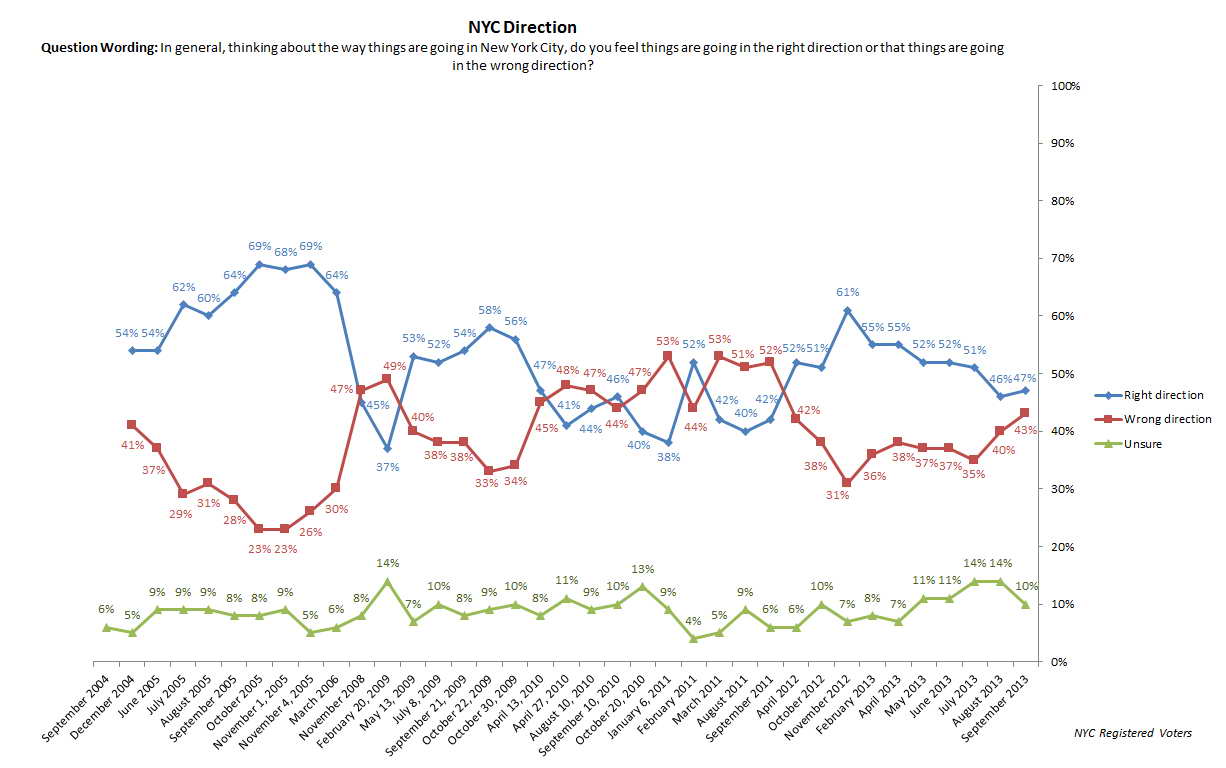September 9, 2013
9/9: de Blasio Leads Mayoral Race by Wide Margin
NBC 4 NY/WSJ/Marist New York City Poll
Going into tomorrow’s primary for New York City mayor, Bill de Blasio has the support of 36% of Democrats who are likely to vote, including those who are undecided yet leaning toward a candidate and those who voted absentee. Bill Thompson battles the onetime frontrunner, Christine Quinn, for second place. Both candidates trail de Blasio by double digits.
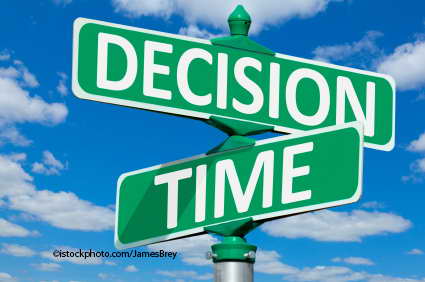 Among likely Democratic voters in New York City, including those who are undecided yet leaning toward a candidate and those who voted absentee, if the Democratic primary were held today, here is how the contest would stand:
Among likely Democratic voters in New York City, including those who are undecided yet leaning toward a candidate and those who voted absentee, if the Democratic primary were held today, here is how the contest would stand:
- 36% Bill de Blasio
- 20% Bill Thompson
- 20% Christine Quinn
- 7% Anthony Weiner
- 5% John Liu
- 1% Erick Salgado
- 1% Sal Albanese
- <1% Randy Credico
- <1% Neil Grimaldi
- 1% Other
- 8% Undecided
POLL MUST BE SOURCED: NBC 4 New York/Wall Street Journal/Marist Poll
“Bill de Blasio leads Quinn among women and Thompson among African Americans,” says Dr. Lee M. Miringoff, Director of The Marist College Institute for Public Opinion. “His campaign is being fueled by Democratic voters’ dislike of extending term limits, the policy of stop and frisk, and of course, the Dante effect.”
Just three weeks ago, Quinn — 24%, de Blasio — 24%, and Thompson — 18% vied for the lead among likely Democratic voters. In that previous NBC 4 New York/Wall Street Journal/Marist Poll, Anthony Weiner received the support of 11% while 5% backed John Liu. Two percent were behind Erick Salgado while Sal Albanese and Randy Credico each received 1%. Less than one percent supported Neil Grimaldi, and 2% were for another candidate. 12%, at that time, were undecided.
From where do the candidates receive their support?
- De Blasio does better among likely Democratic voters who are both white and liberal — 43%. He does well among likely Democratic voters in Brooklyn — 40% — and Manhattan — 40%. De Blasio also does well among likely Democratic voters who are African American — 39%, men — 38%, voters 45 or older — 38%, or those who consider themselves to be strong Democrats — 38%.
- Although Quinn does not lead among any group of likely Democratic voters, she does well among those who live in Manhattan — 30%, those who are Jewish — 29%, or those who are white Catholics — 26%.
- Thompson also does not lead among any group of likely Democratic voters. However, he does well among those who live in the Bronx — 26%, those who live in union households — 26%, and those who are African American — 25%.
How strongly do likely Democratic voters with a candidate preference for mayor support their choice of candidate? 53% strongly support their choice of candidate while 33% are somewhat committed to their pick. 13% report they might vote differently, and 1% is unsure. 55% of de Blasio supporters say they strongly back their candidate while 53% of likely Democratic voters who prefer Thompson and 51% who pick Quinn express a similar intensity of support for their choice.
At a lower turnout, among very likely Democratic primary voters in New York City, including those who are undecided yet leaning toward a candidate and those who voted absentee, if the Democratic primary were held today, here is how the contest would stand:
- 37% Bill de Blasio
- 21% Bill Thompson
- 19% Christine Quinn
- 7% Anthony Weiner
- 5% John Liu
- 1% Erick Salgado
- 1% Sal Albanese
- <1% Randy Credico
- <1% Neil Grimaldi
- 1% Other
- 8% Undecided
Looking at registered Democrats in New York City, including those who are undecided yet leaning toward a candidate and those who voted absentee, 33% back de Blasio. Quinn receives the support of 21% while 20% are behind Thompson. Weiner garners 9% of the vote while Liu has 6%. Salgado and Albanese each has the backing of 1%. Credico and Grimaldi each receive less than 1%. One percent of New York City registered Democrats back another candidate, and 9% are undecided.
Last month, 24% of registered Democrats citywide supported Quinn. De Blasio received the support of 21%. 16% were for Thompson, and 12%, at the time, were behind Weiner. Liu had the support of 6% of New York City Democrats. Two percent were for Salgado while Albanese garnered 1%. One percent backed Credico while less than 1% was for Grimaldi. Three percent wanted someone else, and 15% were undecided.
Table: 2013 Democratic Primary for Mayor (NYC Democrats with Leaners and Absentee Voters)
De Blasio Leads Quinn and Thompson in Possible Runoff Races
If none of the candidates receives 40% of the vote in the primary, a runoff will be held. How do the candidates fare in such a situation?
Among New York City Registered Democrats:
- De Blasio — 56% — leads Quinn — 34%. 10% are undecided. De Blasio has opened up a lead over Quinn. In August’s survey, 44% of registered Democrats backed de Blasio compared with 42% for Quinn. 14%, at that time, were undecided.
- Against Thompson, de Blasio also has the advantage. Here, 50% of registered Democrats are for de Blasio compared with 38% for Thompson. 12% are undecided. Last month, 44% backed de Blasio while 36% were for Thompson. At that time, one in five — 20% — was undecided.
“Bill de Blasio is within striking distance of avoiding a runoff, but he still has some ground to cover to pull this off,” says Dr. Lee M. Miringoff, Director of The Marist College Institute for Public Opinion. “If there is a runoff, de Blasio starts as the early favorite.”
Table: Runoff Quinn vs. de Blasio (NYC Democrats)
Table: Runoff Thompson vs. de Blasio (NYC Democrats)
Quinn’s Negative Rating Continues to Rise
Quinn’s image has been tarnished in the eyes of many New York City Democrats. Less than one month ago, a majority of registered Democrats had a positive view of Quinn, but her favorable rating has continued to erode. In contrast, de Blasio is the candidate most positively viewed. Thompson also has a positive rating from a majority of registered Democrats citywide while Anthony Weiner’s favorability continues to scrape bottom.
- About two-thirds of registered Democrats — 66% — have a favorable impression of de Blasio while 21% have an unfavorable opinion of him. 13% have either never heard of him or are unsure how to rate him. In NBC 4 New York/Wall Street Journal/Marist’s previous survey, 59% of Democrats thought well of de Blasio, 14% had a negative view of the candidate, and 26% had either never heard of him or were unsure how to rate him.
- When it comes to Thompson’s favorable rating, 59% have a positive opinion of him. 21% have an unfavorable view of him, and 20% have either never heard of him or are unsure how to rate him. In August, 56% had a favorable view of Thompson. 18% had an unfavorable impression of him, and 26% had either never heard of him or were unsure how to rate him.
- Just 46% of registered Democrats now have a favorable view of Quinn while 42% have an unfavorable opinion of her. 12% have either never heard of her or are unsure how to rate her. In August, 54% of registered Democrats thought highly of Quinn. 32%, at that time, had an unfavorable impression of her, and 13% had either never heard of her or were unsure how to rate her.
- Only 28% of registered Democrats have a favorable opinion of Weiner. 64% have an unfavorable view of him while 7% have either never heard of him or are unsure how to rate him. There has been little change on this question since last month when 26% had a favorable perception of Weiner, 63% had an unfavorable view of him, and 11% had either never heard of him or were unsure how to rate him.
Table: Bill de Blasio Favorability (NYC Democrats)
Table: Bill de Blasio Favorability Over Time (NYC Democrats)
Table: Bill Thompson Favorability (NYC Democrats)
Table: Bill Thompson Favorability Over Time (NYC Democrats)
Table: Christine Quinn Favorability (NYC Democrats)
Table: Christine Quinn Favorability Over Time (NYC Democrats)
Table: Anthony Weiner Favorability (NYC Democrats)
Table: Anthony Weiner Favorability Over Time (NYC Democrats)
End Stop and Frisk, Say 52%… de Blasio Bests Competition on Issue
More than half of New York City registered Democrats — 52% — do not want the next mayor to continue the controversial policy of stop and frisk. 40% want the practice to be continued, and 9% are unsure. When NBC 4 New York/Wall Street Journal/Marist last reported this question in June, 48% of registered Democrats wanted to put an end to stop and frisk. 44% wanted the policy to continue, and 8% were unsure.
With which candidate do New York City registered Democrats most closely identify on this issue? 37% report de Blasio’s position on stop and frisk comes closest to their opinion. 22% believe Thompson’s stance on the issue best reflects their own while 21% think Quinn’s position on stop and frisk is closest to their view. Three percent believe another candidate is the closest match, and 17% are unsure.
Table: Should the Next Mayor Continue Stop and Frisk (NYC Democrats)
Table: Candidate who Comes Closest to Personal Opinion of Stop and Frisk (NYC Democrats)
De Blasio Viewed as Candidate Most Capable of Making City Affordable
While almost six in ten registered Democrats in New York City believe making the city more affordable is out of the next mayor’s control, nearly four in ten Democrats say Bill de Blasio is the candidate who would be most able to ease the cost of living for the average family.
59% of registered Democrats citywide believe the cost of living in New York City is beyond the mayor’s control. 35% think the next mayor will be able to make the city more affordable, and 6% are unsure. In June, 58% of registered Democrats said making the city more affordable was out of the mayor’s control. 35%, then, believed the next mayor could make the city more affordable, and 7% were unsure.
39% of registered Democrats have the most confidence in de Blasio to make the city more affordable. 24% say Thompson is the candidate best suited to take on the challenge while 20% say Quinn is most capable of improving the cost of living for the average family in New York City. Four percent believe another candidate would be best able to make the Big Apple more affordable, and 13% are unsure.
How many registered Democrats in the city think it is an affordable place to live? Just 12% think New York City is affordable. This includes 2% who say it is very affordable and 10% who believe it is affordable. A majority — 56% — reports it is not very affordable, and 33% say it is not affordable at all. When NBC 4 New York/Wall Street Journal/Marist last reported this question on June 27th, 14% of Democrats considered the city to be very affordable or affordable. 57% reported it was not very affordable, and 28% thought it was not affordable at all.
Table: Will the Next Mayor Make New York City More Affordable? (NYC Democrats)
Table: Candidate Best Able to Make NYC Affordable (NYC Democrats)
Table: The Cost of Living in New York City (NYC Democrats)
Paying a Toll for Extending Term Limits?
In 2008, term limits were extended to allow Mayor Michael Bloomberg to run for a third term. When it comes to their vote for mayor now, do registered Democrats in New York City care whether or not a candidate supported that extension? While 52% report it makes little difference to their vote, 36% say it makes them less likely to vote for such a candidate. Only 9% report it makes them more likely to back a candidate, and 2% are unsure.
Table: Impact of Support for Term Limit Extension on Vote (NYC Democrats)
From the Stump to the Tube… de Blasio Gains Most from Campaign Commercials
A majority of registered Democrats — 51% — who have seen a campaign television commercial for de Blasio, Quinn, and Thompson think de Blasio’s ads top the charts. 20% say Thompson’s commercials are best while 16% believe Quinn’s campaign ads are most appealing. 13% are unsure.
What kind of an impact are these campaign television commercials having? 59% of registered Democrats who have seen an ad for de Blasio say they like him more after viewing it. 16% believe the information they gathered from the commercial made them like him less while 22% say the ad made no difference. Three percent are unsure. 73% of registered Democrats report they have viewed a television ad for de Blasio. 25% have not, and 2% are unsure.
When it comes to Thompson, a majority of those who have seen one of his television commercials — 51% — say the ad made them like Thompson more after they saw it. 15%, however, say it had a negative impact on their opinion of the candidate, and 29% say it made no difference. Four percent are unsure. 69% of registered Democrats citywide have seen a Thompson television commercial. 29% have not, and 2% are unsure.
While the television commercials for de Blasio and Thompson have been well received by registered Democrats, the same cannot be said for Quinn. Just 36% of registered Democrats who have seen a television ad for Quinn say it made them like her more. 33% report it made them like her less, and 28% say it did not have an impact. Three percent are unsure. 72% of registered Democrats have seen a television advertisement for Quinn. 26% have not, and 2% are unsure.
Table: Impact of de Blasio Ads (NYC Democrats Who Have Seen an Ad for de Blasio)
Table: Seen a Campaign Ad for Bill de Blasio (NYC Democrats)
Table: Impact of Thompson Ads (NYC Democrats Who Have Seen an Ad for Thompson)
Table: Seen a Campaign Ad for Bill Thompson (NYC Democrats)
Table: Impact of Quinn Ads (NYC Democrats Who Have Seen an Ad for Quinn)
Table: Seen a Campaign Ad for Christine Quinn (NYC Democrats)
NYC Comptroller’s Race Too Close to Call
In the Democratic contest for New York City comptroller, Eliot Spitzer — 47% — and Scott Stringer — 45% — are in a tight contest among likely Democratic voters in New York City, including those who are undecided yet leaning toward a candidate and those who voted absentee. Less than one percent supports someone else, and 7% are undecided.
In NBC 4 New York/Wall Street Journal/Marist’s August survey, 54% of Democrats who said they were likely to vote in the primary, including those who were undecided yet leaning toward a candidate, backed Spitzer. 36% were for Stringer, and 1% was behind another candidate. Nine percent were undecided.
When it comes to intensity of support, 54% of likely Democratic voters with a candidate preference for comptroller strongly support their choice of candidate. 32% are somewhat behind their selection for comptroller while 13% might vote differently. One percent is unsure. 57% of likely Democratic voters who support Stringer are firmly committed to him. This compares with 51% of Spitzer’s backers who strongly support him.
At a lower turnout, among very likely Democratic primary voters including those who are undecided yet leaning toward a candidate and those who voted absentee, Scott Stringer — 47% — is closely matched with Eliot Spitzer — 46%. One percent supports someone else, and 7% are undecided.
“Stringer has closed a once double-digit lead by Spitzer to make this a tossup,” says Dr. Lee M. Miringoff, Director of The Marist College Institute for Public Opinion. “If turnout is low, Stringer’s chances of winning improve.”
Among registered Democrats in New York City, including those who are undecided yet leaning toward a candidate and those who voted absentee, 49% are for Spitzer compared with 41% for Stringer. One percent want to elect another candidate, and 10% are undecided.
In August’s survey, Spitzer had the support of 53% of these voters compared with 34% who supported Stringer. One percent, at that time, was for another candidate, and 11% were undecided.
Table: 2013 Democratic Primary for Comptroller (NYC Democratic Likely Voters with Leaners and Absentee Voters)
Table: 2013 Democratic Primary for Comptroller (NYC Democrats with Leaners and Absentee Voters)
Bloomberg Approval Rating Status Quo
46% of registered voters in New York City approve of the job Mayor Michael Bloomberg is doing in office. This includes 14% who think he is doing an excellent job and 32% who believe he is doing a good one. 33% rate Bloomberg’s performance as fair while 19% say he is performing poorly. Three percent are unsure. Registered Democrats have a similar impression of how the mayor is doing in office. 44% approve of Mayor Bloomberg’s job performance while 54% do not.
When NBC 4 New York/Wall Street Journal/Marist reported this question in August, 44% of registered voters gave Bloomberg high marks. 31% thought his job performance was fair while 21% said he fell short. Five percent, then, were unsure.
Table: Bloomberg Approval Rating (NYC Registered Voters)
Table: Bloomberg Approval Rating Over Time (NYC Registered Voters)
Voters’ Impressions of City’s Direction Little Changed
47% of registered voters citywide think the Big Apple is moving in the right direction. 43% believe it is moving on the wrong path, and 10% are unsure. The city’s registered Democrats share this view. 47% are upbeat about the city’s trajectory, and 44% think it must change its course. Nine percent are unsure.
In August, 46% of registered voters said the city was on the right track. 40% believed it was on the wrong course, and 14% were undecided.
Table: New York City Direction (NYC Registered Voters)
Table: New York City Direction Over Time (NYC Registered Voters)

